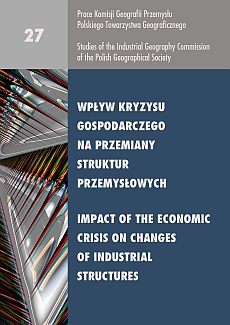Changes in the spatial structure of the automotive industry in Brazil at the turn of the 20th and 21st century
DOI:
https://doi.org/10.24917/20801653.27.2Keywords:
Brazil, spatial concentration, Mercosur, automotive industry, location coefficientAbstract
In recent decades, the automotive industry in Brazil has undergone a profound transformation connected with the modernization of production, increase in the efficiency and quality of produced vehicles. These processes took place in a situation of progressive liberalization of the economy, regional integration within Mercosur and globalization. The high rate of economic growth and stability in the country contributed to the rapid growth in demand for new vehicles. Local factories struggled to keep up with the rising demand and have noted the new production records each year. The rapid growth of sales on the domestic market and in the neighboring countries has prompted international companies to further investments to expand production capacity in Brazilian car factories. New foreign investments arriving in Brazil radically changed the spatial structure of the automotive industry. In the early 1990s, 75% of the cars came from the state of São Paulo, whereas in 2012, its share fell to 41.5%. The new production centers appeared in the states of Parana, Bahia, Rio Grande do Sul, Rio de Janeiro, and further investments are in progress. The purpose of this article is to determine the changes in the spatial structure of the automobile industry in Brazil in the period 1996-2011. Furthermore, the author attempts to determine whether the investments made in the last two decades led to the emergence of new spatial agglomerations of the automotive industry.Downloads
Metrics
References
ANFAVEA (2010, 2013). Tabelas Estatisticas, Associação Nacional dos Fabricantes de Veículos Automotores. Săo Paulo: ANFAVEA. Pozyskano z http://www.anfavea.com.br/tabelas.html
Anuário da Indústria Automobilística Brasileira 2013 (2013). Associação Nacional dos Fabricantes de Veículos Automotores. Săo Paulo: ANFAVEA.
Cavalcante, L.R., Uderman, S. (2007). The Cost of a Structural Change: A Large Automobile Plant in the State of Bahía. Latin American Business Review, 7 (3–4), 11–48. doi:10.1300/J140v07n03_02
CEMPRE (2013). Cadastro Central de Empresas – CEMPRE 1996–2011. Rio de Janeiro: Instituto Brasileiro de Geografia e Estatística – IBGE. Pozyskano z http://www.sidra.ibge.gov.br/bda/pesquisas/ cempre/default.asp
Czapliński, P., Rachwał, T., Tobolska, A., Uliszak, R. (2013). Geografia gospodarcza. Przewodnik do ćwiczeń. Poznań–Kraków: Bogucki Wydawnictwo Naukowe.
Humphrey, J. (2003). Globalisation and Supply Chain Networks: The Auto Industry in Brazil and India. Global Networks, 3 (2), 121–141.
Ibusuki, U., Bernardes, R.C., Consoni, F., Saito, O.M. (2012). New Brazilian Automobile Industrial Policy (Plano Brasil Maior): risk and opportunities for the sector. 20th GERPISA International Colloquium. Krakow. Pozyskano z http://gerpisa.org/node/1649
Laplane, M.F., Sarti, F. (1997). The Restructuring of the Brazilian Automobile Industry in the Nineties’, Actes du GERPISA, 20, 31–49.
Laplane, M.F., Sarti, F. (2004). MERCOSUR: Integration between Governments and Producers and the Sustainability of the Regional Automobile Industry. W: J. Carrillo, Y. Lung, R. van Tulder (red.). Cars, Carriers of Regionalism? Houndmills-New York: Palgrave Macmillan, 121–138.
Lopes, R.L. (2007). The Automobile Industry in Paraná: The Case of Renault. Latin American Business Review, 7 (3–4), 77–96. doi: 10.1300/J140v07n03_04
Łasak, P. (2013). Nowa pozycja państw BRIC na globalnym rynku samochodowym. Studia Ekonomiczne, 2, 329–346.
Perobelli, F.S., Haddad, E.A., Bastos, S.Q. de A., Pimentel, E. (2007). Fiscal Incentives and Regional Development Projects: Mercedes-Benz in Juiz de Fora (MG)–Brazil 1996/1999. Latin American Business Review, 7 (3–4), 49–75. doi: 10.1300/J140v07n03_03
Quadros, R., Consoni, F. (2009). Innovation capabilities in the Brazilian automobile industry: a study of vehicle assemblers’ technological strategies and policy recommendations. International Journal of Technological Learning, Innovation and Development, 2 (1), 53–75.
Rachid, A., Donadone, J.C., Bento, P.E.G. (2002). New investments and industrial location: Labour qualification and organisational strategies. 10th GERPISA International Colloquium. Paris. Pozyskano z http://gerpisa.org/rencontre/10.rencontre/papers.pdf/Rachid.pdf
Rodríguez-Pose, A., Arbix, G. (2001). Strategies of Waste: Bidding Wars in the Brazilian Automobile Sector. International Journal of Urban and Regional Research, 25 (1): 134–154. doi: 10.1111/1468-2427.00302
Rodríguez-Pose, A., Tomaney, J. (1999). Industrial Crisis in the Centre of the Periphery: Stabilisation, Economic Restructuring and Policy Responses in the Sao Paulo Metropolitan Region. Urban Studies, 36 (3), 479–498. doi:10.1080/0042098993484
Rodríguez-Pose, A., Tomaney, J., Klink, J. (2001). Local empowerment through economic restructuring in Brazil: the case of the greater ABC region. Geoforum, 32 (4), 459–469. Pozyskano z http:// dx.doi.org/10.1016/S0016-7185(01)00011-2
Salerno M., Arbix, G. (2010). Economic growth, social development and crisis management: recent evolution of the auto industry in Brazil. 18th GERPISA International Colloquium. Berlin. Pozyskano z http://gerpisa.org/node/963
Salerno, M., Marx, R., Zilbovicius, M., Dias, A.V.C. (2009). The Importance of Locally Commanded Design for the Consolidation of Local Supply Chain: the Concept of Design Headquarters. International Journal of Manufacturing Technology and Management, 16 (4), 361–376.
Santos, A.M.M., Pinhão, C.M.A. (1999). Pólos Automotivos Brasileiros. BNDES Setorial, 10, 173– 200. Rio de Janeiro: BNDES. Pozyskano z http://www.bndes.gov.br/SiteBNDES/export/sites/ default/bndes_pt/Galerias/Arquivos/conhecimento/bnset/set1004.pdf
Wójtowicz, M. (2008). Rozwój przemysłu samochodowego w Brazylii w latach 1957–2005. Prace Komisji Geografii Przemysłu Polskiego Towarzystwa Geograficznego, 10, 140–153.
Wójtowicz, M. (2009). Wpływ globalizacji i integracji w ramach MERCOSUR na wymianę handlową produktów przemysłu samochodowego Brazylii w latach 1990–2006. Prace Komisji Geografii Przemysłu Polskiego Towarzystwa Geograficznego, 12, 63–77.
Wójtowicz, M. (2012). Rozwój i przekształcenia przemysłu samochodowego w Brazylii i Meksyku na przełomie XX i XXI wieku. W: M. Drgas, J. Knopek (red.). Gospodarcze problemy Ameryki Łacińskiej. Toruń: Wydawnictwo Adam Marszałek, 161–193.
Downloads
Published
How to Cite
Issue
Section
License
Articles are published under the terms of the Creative Commons License (CC BY-ND 4.0; Attribution– NoDerivs).

